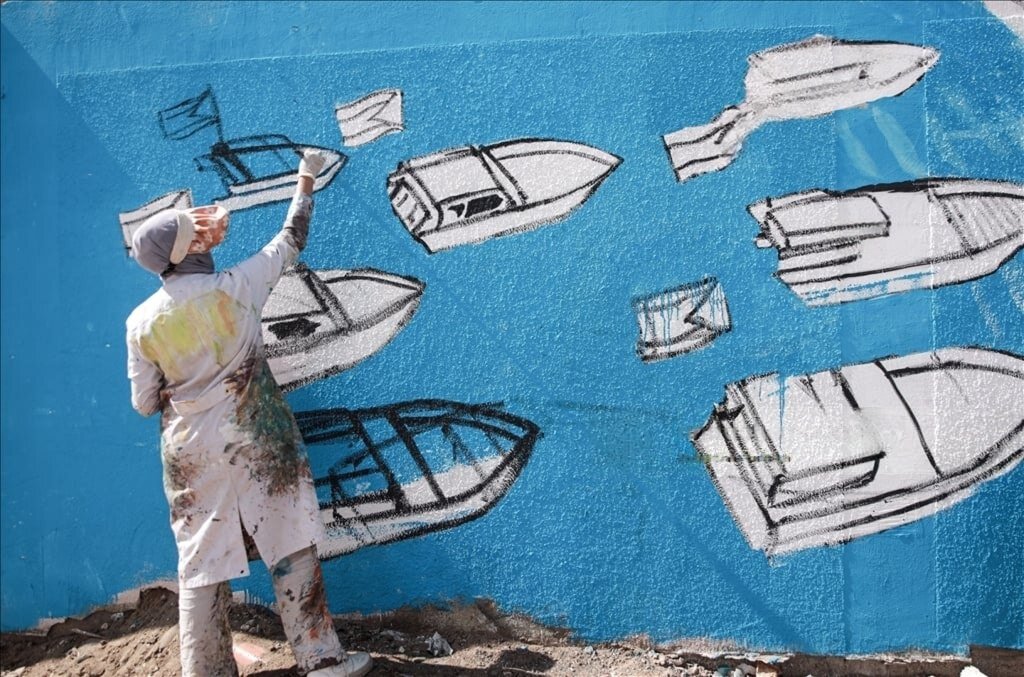Steadfast in defiance, activists detained after Israel intercepts Gaza flotilla

TEHRAN – Israeli naval forces intercepted and boarded the Polish-flagged Marinette on Friday, the last vessel of the Global Sumud flotilla, taking control roughly 42.5 nautical miles off Gaza and towing the boat to Ashdod while detaining its six crew.
The seizure completed the dismantling of a 42-ship convoy after more than 450 activists had already been taken into custody during earlier boardings.
The convoy was not merely symbolic theater. Named “Sumud,” meaning steadfastness, the mission combined shipments of food and medicine with a direct challenge to Israel’s illegal naval blockade.
For Gaza’s starving families—where famine has been officially confirmed and hundreds have died from hunger—such an effort carried both symbolic and practical weight.
Organizers described the voyage as an attempt to establish a “people’s humanitarian corridor,” bypassing Israeli-controlled channels that have consistently restricted or delayed aid.
The hundreds detained included veteran campaigners as well as high-profile figures such as Greta Thunberg and European officials such as France’s Rima Hassan. Many were taken to processing centers, with some reportedly transferred to the Ktzi’ot high-security facility in the Negev desert as deportation proceedings began.
According to the International Committee to Break the Siege of Gaza, several detainees announced an open-ended hunger strike within hours of capture, refusing food “from the moment of detention” to protest abduction and the denial of relief to a besieged civilian population.
Israel’s extremist National Security Minister, Itamar Ben-Gvir, exploited the detainees as props in a political spectacle. He was filmed at the detention site mocking the activists as “terrorists.”
Later in the day, he urged that they be imprisoned “so they can smell the scent of the terrorists’ wing,” and denounced Prime Minister Netanyahu’s plan to deport them as a “fundamental mistake.” Critics described his conduct as intimidation and a violation of the activists’ basic rights.
The legal objections to Israel’s conduct are substantial. Under the UN Convention on the Law of the Sea (UNCLOS), vessels in international waters enjoy freedom of navigation; boarding and seizing a civilian ship there is unlawful unless justified by piracy or self-defense, neither applicable to humanitarian missions.
UN experts have also urged safe passage and stressed that Israel must not interfere with freedom of navigation.
Once activists were detained, the International Covenant on Civil and Political Rights (ICCPR) required that they be informed of the reasons for arrest, given legal counsel, and brought before a judge.
The Fourth Geneva Convention bars occupying powers from obstructing relief consignments, and preventing or attacking humanitarian relief violates these obligations; critics say the flotilla’s interception and the vilification of detainees breached these standards.
Rights groups, including Adalah and Amnesty International, have reported further violations: deportation hearings initiated without notifying detainees’ lawyers, restricted access to legal counsel, and expedited removals. A few activists have already been deported, while others face indefinite detention.
For Gaza, the siege is absolute. With border crossings sealed and maritime relief blocked, over two million people remain trapped under bombardment, facing famine, disease, and displacement.
The flotilla had been more than a symbolic gesture — it was a small but tangible effort to pierce a blockade widely condemned as collective punishment.
Its capture underscores how few avenues remain to deliver aid or to assert even the most basic rights under international law, especially as Western governments withheld support for Sumud and allowed it to be suppressed by Israel.
The seizure crystallizes a larger choice: whether international norms will protect civilian navigation and humanitarian relief, or whether political spectacle will continue to shield violations of law.
For those aboard the Sumud flotilla, the voyage embodied steadfast resistance. For Gaza’s families, its loss is another measure of how international law is failing those most in need — even as Washington and Tel Aviv claim to promote a new “peace plan” that demands Hamas’s surrender, and many governments rally to pressure the resistance while ignoring the civilians trapped under siege.
The fate of the Sumud shows that while diplomatic energy is consumed by political bargaining, the urgent needs of Gaza’s people — food, medicine, and survival — remain abandoned at sea.
Leave a Comment